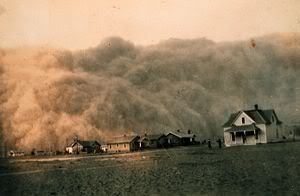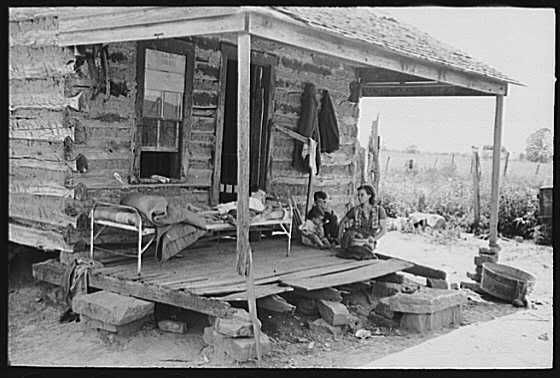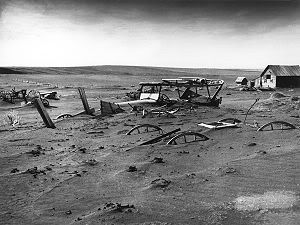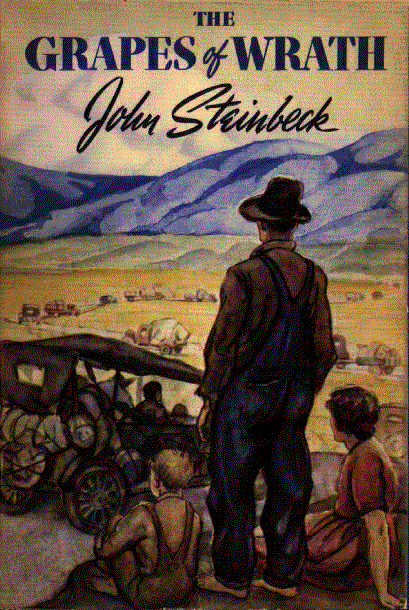My mother’s family were Okies although they all hate that name. “We’re Not Okies, we’re from Kansas!” (Yeah–25 miles from the border). My grandfather was a sharecropper, they didn’t have much, but they liked what they had. Then the Dust Bowl hit southern Kansas.
My grandfather took the trunk lid off of his 1932 Plymouth and built a doghouse sticking out the back. He piled his wife and five daughters into the car. With their belongings–what little they could could take with them–strapped to the top of the car and a trailer filled with household goods, with the bedding on top, they set off West, looking for work along the way.
(more)
They escaped the worst of the Dust Bowl–at the cost of everything they had worked so hard for.
It’s a story straight out of The Grapes of Wrath. Each night they would unload the bedding and make camp. Every morning my grandfather would look for some kind of work. From mucking out stables for supper for himself and his family to migrant farm labor–he would take anything he could get. If there was no work to be had–which happened more often than not–they would pack up and move on, always West, hoping for a better future.
After many years of the whole family picking fruit, or temporary carpentry work, they finally settled in Payette, Idaho. (7 people in a 12′ x 15′ shack with an outhouse and no running water. No shit–I’ve seen it) where my grandfather worked for Union Pacific as a loader. Until they found out that he had lost his lower right leg jumping a freight train when he was 13. They had no problem with his work for 7 years–then fired him for being a “cripple”. The thing that finally helped them out of poverty was the New Deal. In a WPA training course my grandfather learned to be a cobbler and every shoe shop he every had after that had a picture of FDR on the wall.
My maternal grandfather was a strong person and a good father. He was also racist to the bone. He had hatred of anyboby who wasn’t a white, american “christian”. I put Christian in quotes because he was also a hypocrite. Always talking the talk, but never walking the walk. Once in the 1980’s he was busted for using the City Hall basement to show, and sell, porno to the mayor, the police chief and the fire chief of Arkansas City, Kansas. It was a big, local scandal for a while (he and grandma moved back to Kansas in about 1960). While fitting most people’s description–at the time–of White Trash, grandpa hated a lot of people who shared his backgroud and experiences as a sharecropper–just because they were “different”. I admire the way my Grandfather pulled his family up against incredible odds, but I don’t admire him as a person.
A final thought: I don’t think people realize the significance of the phrase, “White Trash.” Poor, white people were distinguished from any other “trash”. In other words anyone whose skin color, or language, differed from their own. The thinking at the time this phrase was coined was that although my family were poor and destitute–at least they were white. I’m not the lexicon police, use it, don’t use it–it’s all the same to me. I just want people to think before they unknowingly use a phrase based in racism.






27 comments
Skip to comment form
Author
The story of how an poor Okie girl married into an upright Mormon family and the fun she had with the family for over 25 years.
to have grandparents who you admire in some ways and not in others. In my particular family situation, the weight is more on the later. So thanks for this wonderful and telling family history.
Your family’s history, coupled to the WPA portfolio of Depression Era images, evoke powerful memories for me.
Much more than everything I’ve ever learned from books about US labor history or Jacob Riis‘s photographic indictment of fin de siecle tenement life or Gordon Parks –all of which brings tears to my eyes– there is this intimacy with poverty and pride that we share.
I’m looking at a portrait of my grandma and two aunts, neither more than ten-years-old, standing before a field, circa 1934. Straight, sinewy figures: My grandpa and she were born in the late-’80s, eloped in the teens, and raised ten children in a NC shack on a parcel, which they owned and annexed to the town cemetery. They lived there in all its bounded glory until they died in the 1970s. Then their heirs squabbled over the property rights.
No, they were not exactly sharecroppers. See, My grandma had white relations. And my grandpa made his living waitering and cooking on passenger trains and summer resorts. He had a good story, I call “Penny Tips,” about my daddy’s first job, bussing. All of his sons, except my daddy, soldiered in and survived WWII. One went to Korea, too. In the meantime and afterward, they pulled my daddy through college and law school and the troubles of the civil rights ‘movement.’ Kicking and screaming, I hear tell.
So he could one day drive south in his Mercedes-Benz with his beautiful wife and beautiful children for family reunions. I reckon that shack wasn’t much more than 800 sf. Before there were too many cousins, we children hostled between two iron bedsteads. I remember best fireflies at night in the cemetery and the coffee cans: one of bacon render in the kitchen, the other of tobacco juice on the back porch. My grandma chewed. My grandpa smoked a pipe.
::
While I lived in NYC, destiny settled me in Mulberry Bend in an apartment as large as that. My own child was christened at the Old St Pat’s. Raised hell during the sacrement, she did, screaming “Out! Out!” Maybe I waited too long?
More on Jacob Riis if you like.
So the editor thingy let you post after all? No more errors? That’s good!
although it was my generation and my family. My Dad followed the big construction jobs following WWII ~ Flaming Gorge Dam, Glen Canyon Dam….and others. We lived in trailers ~ 10 or 12′ x 60′ was a big one until they finally settled in ’60s with a small house in UT. Trailer Park kid here…sometimes trailer park trash when we were growing up.
It will be great to here your family perspective of being Mormon. Growing up as a Mormon…going back to Nauvoo I had some negative experiences!
I love the Payette area of Idaho…and further north! Thanks for sharing your story!
We all have some trash in our backgrounds and some religious hippocrites too!
I guess our collective experiences have made us what we are.
thanks!
Coincidentally, I have been staying in Boise and working in Caldwell for the last week.
I was joking with my wife on the phone just today how I had not seen a black person since I left the Boise airport a week ago.
I have a theory that a lot of so-called “white trash” are actually the scions of white slavery – particularly in Appalachia and the deep south, as well as anywhere the Irish community fled such as Butte, Montana. People don’t just “snap out of it” after being enslaved, though the skin be white (e.g. Jewish folks, blonde mixed bloods raised on the rez, etc.).
Apologies if you already absorbed that, but I have written a diary here which you might find interesting if not relevant to your own family.